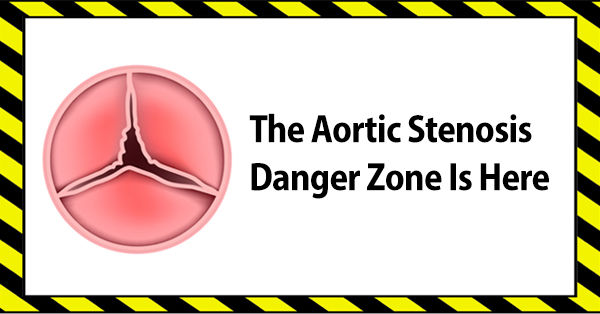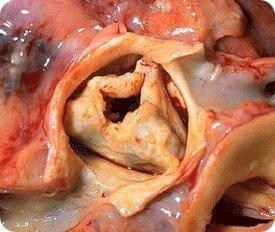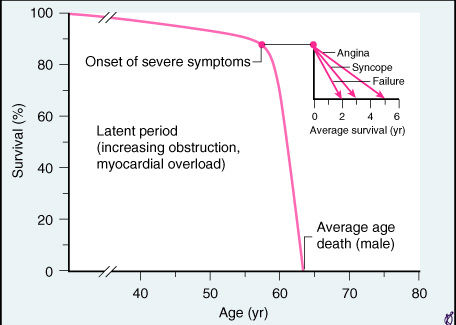The Aortic Stenosis “Danger Zone” Is Here
By Adam Pick on March 4, 2019
I just spoke with a patient who was recently diagnosed with severe aortic stenosis. The nature of our discussion was a bit concerning. So, I wanted to relay the ideas exchanged during our call for all of us to reflect upon and potentially learn from.
To start, the patient is in her golden years and flat-out terrified by the idea of heart surgery. She said to me, “Adam, I may just pass on the operation and live out my days. I don’t really feel sick. Just a little tired on walks.” She continued with fear in her voice and said hesitantly, “Will… I… Be… Okay?”

During my life, I have struggled with communication.
As we all know, there are times to “sugar coat” things. And, we all know there are times to be downright explicit. For me… In this moment… I chose to be open, honest, caring and extraordinarily explicit about the dangers and life-threatening risks of aortic stenosis.
The Realities of Heart Valve Disease
If you are new to this website or have recently been diagnosed with a valvular defect, here are some important facts to consider:
- New research indicates that up to 11 million Americans have some form of heart valve disease.
- 40% of adults have never heard of valvular heart disease.
- More than 25,000 people die from heart valve disorders in the United States every year.
The worst part…
Ready?
Heart valve disease is an insidious, mis-understood disease that is under-diagnosed and significantly under-treated. (More about that later.)
I’ll never forget when Dr. Vaughn Starnes, my surgeon at Keck Medical Center of USC, said to me, “Adam, You have a severely calcified aortic valve. I just looked at your echocardiogram in my office. I would not wait to take care of this.”

During that consult, the words that Dr. Starnes spoke did not alarm me.
Nope.
Instead, it was the look in his eyes that made me quickly understand this was a very serious situation.
Aortic Stenosis Incidence & Mortality
After my consult with Dr. Starnes, I would go on to research just how serious aortic stenosis is.
First off, aortic stenosis is common. According to Dr. Mike Mack, a leading heart surgeon at The Heart Hospital Baylor Plano, up to 12% of the elderly population have some form of aortic stenosis.
Now… Take a minute to consider the medical and economic burden that is about to occur as the nation’s 76 million Baby Boomers enter their peak years of potential cardiac issues. By some accounts, heart valve disease already costs over $23 billion annually. It’s going to get worse and much more expensive.

However, the real danger of aortic stenosis is not its incidence within the aging population.
Nope.
The scary fact about aortic stenosis is this…
According to research by Dr. Eugene Braunwald, once a patient is diagnosed with severe aortic stenosis and that patient experiences symptoms, the survival rate is just 50% after 24 months.
Gulp!!

To recap…
Aortic stenosis is common and about to become much more prevalent as the Baby Boomers age. Plus, the disease is a downright killer that is often mis-diagnosed and often un-treated.
The Under-Treatment of Aortic Stenosis
In this video with Mike Mussallem, the CEO of Edwards Lifesciences, he notes that less than 20% of patients get treated today.
My goodness!!!
Less than 20 percent???
To contextualize that point, consider the Rose Bowl on New Year’s Day.
Imagine that the stadium is packed with aortic stenosis patients. Less than 20 percent will get treated!

I’m no genius.
But, it seems like aortic stenosis is about to transition from a deadly disease into a potential epidemic.
Getting After Aortic Stenosis
The good news is that aortic stenosis, which Dr. Michael Mack and other clinicians commonly refer to as a “Silent Killer”, can be treated. (Fyi, I’m living proof of that.)
Today, the opportunities for aortic stenosis treatment are fantastic!
In addition to traditional surgical valves that have been around for years and years, there are new sutureless heart valves (e.g. Perceval) and valves with high-tech, anti-calcification processes (e.g. Trifecta GT). There are cow valves, pig valves and mechanical valves designed to help patients choose the right valve for their specific lifestyle.
Yes, there are also different incision approaches that include sternotomy, minimally invasive port access, and non-invasive transcatheter paths.
In addition, the recovery from heart surgery is becoming more comfortable thanks to new technologies that minimize post-operative pain including rigid sternal fixation and cryoanalgesia. Just two days ago… I received an email from Dennis, one of Dr. Marc Gerdisch’s patients, who described heart surgery as, “Ton of gain… Zero pain!”
What About The Patient?
If you’re wondering about the patient I mentioned at the beginning of this post…
I did my best to help her understand the realities of aortic stenosis.
I did my best to help her understand that her 3 to 5 days in the hospital could potentially keep her from being 6 feet underground.
I did my best to help her realize that heart valve surgery can be a small and wonderful chapter in her “Book of Life”.
Was it enough? Did I effectively communicate the aortic stenosis dangers and the treatment opportunities for the patient?
I don’t know yet.
The patient thanked me for the call.
The patient said she would probably have surgery.
I really hope she does.
Don’t stop learning about aortic stenosis and its treatment:
- Aortic Stenosis Progression: Top 5 Facts Patients Should Know
- The Guide to Aortic Stenosis Symptoms, Diagnosis & Treatment
- Surgeon Q&A: Aortic Valve Calcification Explained
- Breaking News: Low-Risk TAVR Clinical Trial Results Released!
Keep on tickin!
Adam











